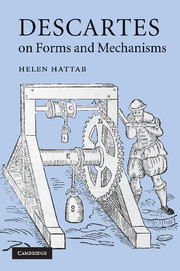Book contents
- Frontmatter
- Contents
- Acknowledgments
- List of abbreviations
- Introduction
- PART I RESURRECTING THE SUBSTANTIAL FORM
- PART II CHALLENGING THE SUBSTANTIAL FORM
- PART III ELIMINATING SUBSTANTIAL FORMS
- 7 Atoms, modes, and other heresies
- 8 Descartes' metaphysical alternative to substantial forms
- Conclusion
- Works cited
- Index
7 - Atoms, modes, and other heresies
Published online by Cambridge University Press: 15 September 2009
- Frontmatter
- Contents
- Acknowledgments
- List of abbreviations
- Introduction
- PART I RESURRECTING THE SUBSTANTIAL FORM
- PART II CHALLENGING THE SUBSTANTIAL FORM
- PART III ELIMINATING SUBSTANTIAL FORMS
- 7 Atoms, modes, and other heresies
- 8 Descartes' metaphysical alternative to substantial forms
- Conclusion
- Works cited
- Index
Summary
In this chapter I examine the metaphysical basis for Gorlaeus' elimination of substantial forms before unpacking Descartes' argument against material substantial forms based on the substance/mode distinction (argument 5 among the ones he offers to Regius). Gorlaeus firmly rejects the Aristotelian substance/accident distinction in favor of a substance/mode ontology, and hence anticipates Descartes' later metaphysics. Little is known about David Gorlaeus. Most of the scanty biographical details we have were uncovered by F. M. Jaeger in 1918. Christoph Lüthy, in an article on Gorlaeus' atomism, supplements Jaeger's findings with a few more recent discoveries. Two works by Gorlaeus survive: the Exercitationes Philosophicae (Philosophical Exercises) published in 1620, and the Idea Physicae (Physical Idea), which did not appear in print until 1651. I will focus on the Exercitationes, both because of its earlier publication date and because it contains the metaphysical foundations of Gorlaeus' physics, whereas the Idea Physicae is a summary of his physics. Both works were published posthumously, since Gorlaeus died in 1612, at the young age of twenty-one. From the fact that Gorlaeus refers to Galileo's telescopic discoveries, Lüthy establishes that these works were written sometime between 1610 and 1612. That someone so young could have authored them is remarkable. Lüthy attributes the innovative ideas they contain in part to Gorlaeus' educational trajectory. In 1606 Gorlaeus enrolled as a student at the Frisian University of Franeker, where he would have been exposed to the natural philosophy of Italian naturalist philosophers, like Girolamo Cardano, through the teachings of Professor Henrico de Veno. In 1611, he enrolled as a theology student at the University of Leiden just before the controversy over the hire of Vorstius broke out.
- Type
- Chapter
- Information
- Descartes on Forms and Mechanisms , pp. 160 - 185Publisher: Cambridge University PressPrint publication year: 2009



